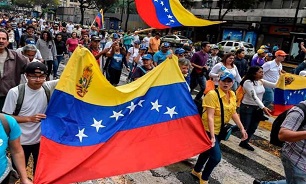Russia’s Envoy to Venezuela Sees No Grounds for ‘Dual Power’ Claims
 "All those remarks, which are made about dual power, in my view, don’t have any serious grounds, because Guaido does not have any power. He may have been trying to get them, but at the moment he cannot use them," the envoy said in an interview with the Rossiya-24 TV channel.
"All those remarks, which are made about dual power, in my view, don’t have any serious grounds, because Guaido does not have any power. He may have been trying to get them, but at the moment he cannot use them," the envoy said in an interview with the Rossiya-24 TV channel.
The ambassador noted that "the attempts have been made to strip the Maduro government of its powers, but so far this has been ongoing at the level of psychological pressure."
Juan Guaido, Venezuelan opposition leader and parliament speaker, whose appointment to that position had been cancelled by the country’s Supreme Court, declared himself interim president at a rally in the country’s capital of Caracas on January 23. Several countries, including the United States, Lima Group members (excluding Mexico), Australia, Albania, Georgia and Israel, as well as the Organization of American States, recognized him as president.
President Nicolas Maduro, in turn, blasted the move as a coup staged by Washington and said he was severing diplomatic ties with the US. On January 29, Washington imposed sanctions against Venezuela’s oil producer PDVSA and handed over to Guaido control over a part of Venezuela’s assets in US banks.
Meanwhile, Spain, France, Germany, the United Kingdom and the Netherlands said that they would recognize Guaido as Venezuela’s interim president unless Maduro called elections by February 3.
In contrast, Russia, Belarus, Bolivia, Iran, Cuba, Nicaragua, El Salvador and Turkey voiced support for Maduro, while China called for resolving all differences peacefully and warned against foreign interference. The United Nations secretary general, in turn, called for dialogue to resolve the crisis.
Message end/
